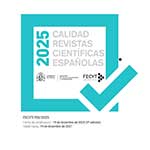The Transparency of Intelligent Administration in Spain: New Borders of the Freedom of Information
Abstract
Technological development has provided the Public Administration with new tools: algorithms and Artificial Intelligence systems, which allow for the automation of procedures, the provision of information to citizens through web portals, or access to the administration without the limitation of physical spaces.
However, these technological instruments that facilitate the effectiveness, efficiency and improve the quality of public management are not exempt from certain risks, since they are not infalible and, therefore, have a margin of error. At this point, the approach of this study arises on the need for the Public Administration to also be transparent in this aspect and allow access to public information on the use of these technologies. The justification for this new duty of the administration is found in the impact that the use of these systems has on the lives of citizens.
This article aims to analyses various cases in Spain that are relevant to show the conflict that exists between the transparency of "smart Public Administrations" and the right of access to information, since it has been observed that there is a need to know how processes based on these AI decide on the lives of citizens and the effect they have on their rights and freedoms, especially when these AIs offer unexpected results.
One of the conclusions reached after reviewing the cases studies is that if an Artificial Intelligence system cannot be transparent, it should not be used by the Public Administration, since efficiency in administrative decision-making cannot put citizens' rights and freedoms at risks.
Article download
License
In order to support the global exchange of knowledge, the journal Derecom. Derecho de la Comunicación is allowing unrestricted access to its content as from its publication in this electronic edition, and as such it is an open-access journal. The originals published in this journal are the property of the Complutense University of Madrid and any reproduction thereof in full or in part must cite the source. All content is distributed under a Creative Commons Attribution 4.0 use and distribution licence (CC BY 4.0). This circumstance must be expressly stated in these terms where necessary. You can view the summary and the complete legal text of the licence.







